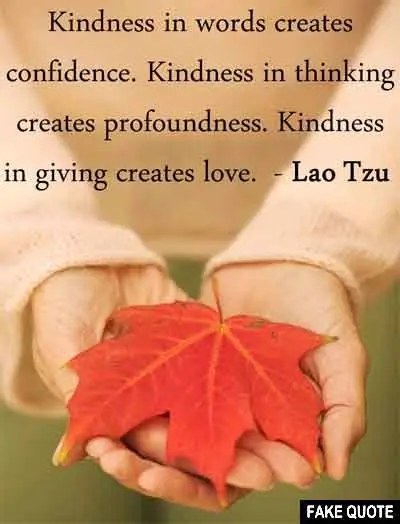|
Tao Te Ching
THE TAOISM OF LAO TZU
|
Fake Lao Tzu Quote"Kindness in words..."
This is NOT a quote from Tao Te Ching:"Kindness in words creates confidence. Kindness in thinking creates profoundness. Kindness in giving creates love."
Any Lao Tzu quote containing the word love is almost certainly fake. That's something he did not discuss in Tao Te Ching. How we emphasize and understand love is something that has evolved through two thousand years of Christianity. Not that the sentiment was unknown to thinkers of antiquity around the world, but it was presented differently, and overall much less so. Lao Tzu didn't dwell on it at all.
Profoundness is an awkward word in English. Shouldn't it rather be profundity? At least it would be more elegant when translating a philosophical text more than two thousand years old. But the quote has nothing to do with Lao Tzu, if it's not from a very off translation of his text. There are many such translations. Amusingly, there are also Internet sites (like Azquotes) and memes accrediting the quote to Mao Zedong, the former Chinese leader. I wouldn't think he had that much to say about love, either. I have also found the quote accredited to the Greek fabulist Aesop, in Scientific Concepts Behind Happiness, Kindness, and Empathy in Contemporary Society from 2019, edited by Nava R. Silton (page xxv). Unfortunately, there is no source specified. Also some websites claim Aesop as the origin of the quote, but this may simply be a misreading of collections, where quotes of Aesop and Lao Tzu are listed one after the other. There are many of those. According to a learned blog discussion on the Useless Tree website in August, 2008, the earliest appearance of the quote in an English language book is Peter's Quotations: Ideas for Our Time, by Laurence J. Peter, 1977. He is most famous for The Peter Principle. Peter claimed it to be a quote from Lao Tzu (page 279), but gave no source to that claim, nor the number of a Tao Te Ching chapter. There is one more quote accredited to Lao Tzu in Peter's book (page 292): "The greater the number of laws and enactments, the more thieves and robbers there will be." This quote originates in The Sayings of Lao Tzu by Lionel Giles (page 38), which is from 1904 but with many later editions. Giles translated Tao Te Ching, but rearranged the chapters according to topics. Peter's quote about kindness, though, is not from this source. It is likely that he got it from a book published the year before, in 1976: Living thoughts: Inspiration, Insight, and Wisdom from Sources throughout the Ages, by Bernard S. Raskas. It has the kindness quote on page 143, accrediting it to Lao Tzu. If I have to guess, I'd say that this fake quote is an off interpretation of a few lines in chapter 67 of Tao Te Ching. Here is my version of them:
Stefan Stenudd April 2, 2017, revised September 9, 2020.
More Fake Lao Tzu QuotesThere are many more fake Lao Tzu quotes examined on this website. Click the header to see a list of them.
Fake interview with the authorClick the header to read a "fake" interview with Stefan Stenudd, the author of Fake Lao Tzu Quotes.
About CookiesMy Other Websites:I Ching OnlineThe 64 hexagrams of the Chinese classic I Ching and what they mean in divination. Try it online for free.
Qi Energy ExercisesThe ancient Chinese life energy qi (chi) explained, with simple instructions on how to exercise it.
Life EnergyThe many ancient and modern life force beliefs all over the world explained and compared.
Taoismen på svenska
Other Books by Stefan StenuddClick the image to see the book at Amazon (paid link).
The Greek philosophers and what they thought about cosmology, myth, and the gods. |
 Tao Te Ching
Tao Te Ching Now it's a book, too!
Now it's a book, too! Tao Quotes
Tao Quotes Cosmos of the Ancients
Cosmos of the Ancients Qi — Increase Your Life Energy
Qi — Increase Your Life Energy Aikido Principles
Aikido Principles Life Energy Encyclopedia
Life Energy Encyclopedia Archetypes of Mythology
Archetypes of Mythology Psychoanalysis of Mythology
Psychoanalysis of Mythology Stefan Stenudd
Stefan Stenudd